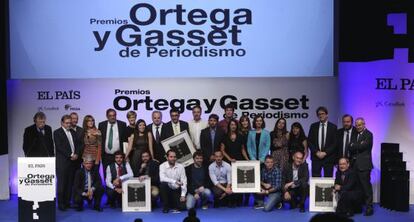EL PAÍS journalism awards celebrate the power of a free press
‘Guardian’ editor Alan Rusbridger delivers a passionate speech at Thursday’s ceremony

The 31st Ortega y Gasset Awards for excellence in journalism were handed out on Thursday at a Madrid ceremony that brought together business, culture and media leaders in an impassioned defense of a free press.
The winners, which were announced in April, recognized social justice reporting on both sides of the Atlantic, with issues ranging from the human cost of drug trafficking in Central America to home evictions in Spain. The career excellence award went to the editor of The Guardian, Alan Rusbridger for his publication’s coverage of the Edward Snowden whistleblower story.
Arturo Pérez-Reverte, a veteran journalist and bestselling author (Alatriste, The Ninth Gate), delivered a moving speech about the importance of a free press as a check against power.
“The only way to keep the powerful on the edge of a healthy feeling of fear is to have a free, lucid, educated, efficient and independent press. Without that check, democracy and decency are impossible,” said Pérez-Reverte to a crowd that included the current and past editors of EL PAÍS, which organizes the awards.
The writer focused on the poor treatment that Spanish journalism has been suffering in recent years.
Power and those who seek to hold on to it or attain it are not prepared to pay the price of a free press”
“Power and those who seek to hold on to it or attain it are not prepared to pay the price of a free press. Just look at those [political] press conferences with no questions, at the fear of public appearances, and at those election debates where politicians and their teams, not free-acting journalists, decide on the format,” he said, laying part of the blame on submissive reporters and docile media outlets that all too easily bow to political and financial power.
Pérez-Reverte also lamented the “devastating” contempt for culture and education in Spain, and the sectarian dogmatism that permeates all aspects of life, including newsrooms.
“An independent press is the only thing that can keep the bad guys at bay and guarantee the future of free men,” he concluded.
The new editor-in-chief of EL PAÍS, Antonio Caño, also spoke with feeling at his first Ortega y Gasset ceremony at the helm of the newspaper.
“It is possible that some traditional forms of journalism will make no sense in the future, but I trust that journalists and the kind of work we are rewarding today will always find an audience that appreciates and needs them,” he said.
Flanked by the four former editors of EL PAÍS, Juan Luis Cebrián, Joaquín Estefanía, Jesús Ceberio and Javier Moreno, Caño addressed the challenges up ahead (“old giants are buckling and new actors are joining the competition”) and discussed his vision for the newspaper, based on developing the digital version and expanding in the Americas.
“The Americas are the natural market for a newspaper such as ours, which can boast about having had a global, cosmopolitan outlook even before the word global began to be used,” said Caño, who was the Washington correspondent before taking over from Moreno.
The Guardian editor Alan Rusbridger also took the podium to talk about the pressure he received in connection with WikiLeaks and the Snowden case, and to underscore the importance of having “a community of journalists cooperating with each other.”
Tu suscripción se está usando en otro dispositivo
¿Quieres añadir otro usuario a tu suscripción?
Si continúas leyendo en este dispositivo, no se podrá leer en el otro.
FlechaTu suscripción se está usando en otro dispositivo y solo puedes acceder a EL PAÍS desde un dispositivo a la vez.
Si quieres compartir tu cuenta, cambia tu suscripción a la modalidad Premium, así podrás añadir otro usuario. Cada uno accederá con su propia cuenta de email, lo que os permitirá personalizar vuestra experiencia en EL PAÍS.
¿Tienes una suscripción de empresa? Accede aquí para contratar más cuentas.
En el caso de no saber quién está usando tu cuenta, te recomendamos cambiar tu contraseña aquí.
Si decides continuar compartiendo tu cuenta, este mensaje se mostrará en tu dispositivo y en el de la otra persona que está usando tu cuenta de forma indefinida, afectando a tu experiencia de lectura. Puedes consultar aquí los términos y condiciones de la suscripción digital.








































